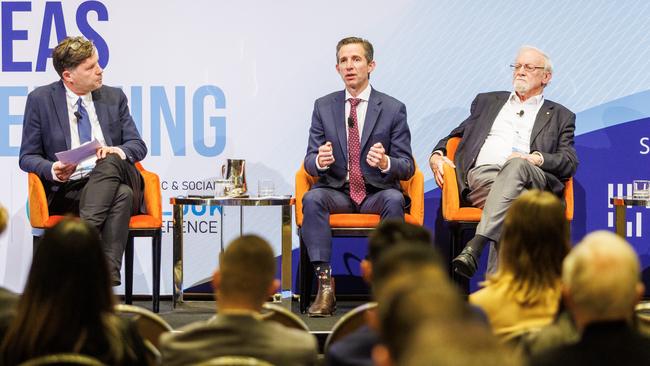China ‘jangles nerves’ of an unstable world
Military build-up and aggressive behaviour in the South China Sea is making it difficult to strike the right balance with the superpower, former Labor foreign minister Gareth Evans says.

China is “jangling” nerves” around the world amid a tense period of global instability, former Labor foreign minister Gareth Evans says.
And opposition foreign affairs spokesman Simon Birmingham has warned of the global instability arising out of the strategic competition between the US and China.
Mr Evans, foreign minister from 1988-96, said China’s large-scale military build-up and aggressive behaviour in the South China Sea is making it difficult to strike the right balance with the superpower.
“So many nations in our region, Australia included, are obviously trying to … work this balancing act,” he said. “(Anthony Albanese) has been at it, quite successfully so far this week, balancing between the United States and China, but it's really, really hard work.
“For these reasons, China is jangling nerves around the place, with its large-scale military build-up, including its nuclear arsenal, its behaviour in the South China Sea and the assertiveness it is showing on other territorial fronts with Japan and India still.”
Mr Evans, now an honorary professor at the Australian National University, made the remarks at the 2023 Outlook Conference, co-hosted by The Australian and the University of Melbourne.
Speaking on the same panel as Mr Evans on the “new global disorder”, Senator Birmingham said there were significant challenges arising out of conflicts around the world.
“We absolutely stand in a period in time where the global order is challenged,” he said.
“Where multilateral institutions we have come to rely upon are under greater threat and dysfunction than at any time in recent years.
“The rules-based order is being ignored, defied and overruled.”
On the international conflicts in the Middle East and in Ukraine, the United Nations and World Trade Organisation have been completely ineffective, Senator Birmingham said.
“And this, of course, is all happening in a world where we have got the rise of strategic competition between the two powers of the US and China,” he said.
“Plus a period where, frankly, the world is probably allowed … to too great an extent the rising power and influence of bad-faith actors.
“Bad-faith actors don’t appear to get better with time. We see that with Russia, we see that with Iran and we see that with North Korea.”
As well, he said, a combination of rising economic standards that are contributing to global inequality, the way different countries are responding to climate change, how Covid was handled and perceptions of postcolonial policies are all presenting risks.
Mr Evans largely agreed with Senator Birmingham’s analysis, also saying the global order is vulnerable and geostrategic outlook is as volatile as it has been “for a very long time”.
He said cross-border aggression has been challenged by Russia in its invasion of Ukraine, the international law of the sea is “under stress” with China’s behaviour in the South China Sea, and international humanitarian law is under stress with Israel’s response in Gaza.
“The global trading system has been challenged by nationalism, protectionism and isolationism,” Mr Evans said. “The global south, led by China, is no longer content just to be rule-takers.
“They want to be rule-makers, they're fed up with what they see as the hypocritical double standards … of the global north, the poster child still being the 2003 US invasion of Iraq.
“And they are fed up with the perceived one-sided response on the Israel-Gaza (conflict)”.





To join the conversation, please log in. Don't have an account? Register
Join the conversation, you are commenting as Logout